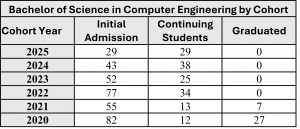PROGRAM LEVEL
The 135-credit Bachelor of Science in Computer Engineering program is accredited by the Engineering Accreditation Commission of ABET in the United States and placed in the National Qualification Framework of Bahrain. The curriculum plan consists of different technical and non-technical courses that include engineering, mathematics, programming and networking. In addition, it is associated with numerous practical laboratory courses, a training program and a senior project design experience. The curriculum plan is revised periodically to ensure that it meets the needs of the department stakeholders (e.g. students, employers, and staff). A degree in Computer Engineering opens the door to a wide range of career opportunities. Both large and small companies that build or use computer-based systems recruit Computer Engineering graduates for positions in telecommunications, manufacturing, product development, healthcare etc.. Many computer engineers also get jobs as programmers.
While they have less programming experience than computer science graduates, their understanding of hardware gives them an advantage in dealing with overall systems. The B.Sc. in Computer Engineering program is accredited by the Engineering Accreditation Commission of ABET. For more information please refer to http://www.abet.org/
ABOUT THE PROGRAM
DETAILED STUDY PLAN
- Press here to download the Academic Plan of the program – 2024 (PDF، 0.4 MB، 13 Pages)
- Press here to download the Academic Plan of the program – 2018 (PDF، 0.6 MB، 15 Pages)
- Press here to download the Academic Plan of the program – 2014 (PDF، 0.7 MB، 14 Pages)
PROGRAM OBJECTIVES
- Engage successfully in careers in the areas of computer engineering to serve the needs of industry and academia or embark on entrepreneurial path.
- Engage in life-long learning, professional development, seek further learning opportunities, adapt to the changes in the work environment, and attain leadership competencies.
- Contribute to the welfare of society and the development of the profession through responsible and ethical practice of engineering.
PROGRAM INTENDED LEARNING OUTCOMES
(1) an ability to identify, formulate, and solve complex engineering problems by applying principles of engineering, science, and mathematics.
(2) an ability to apply engineering design to produce solutions that meet specified needs with consideration of public health, safety, and welfare, as well as global, cultural, social, environmental, and economic factors
(3) an ability to communicate effectively with a range of audiences
(4) an ability to recognize ethical and professional responsibilities in engineering situations and make informed judgments, which must consider the impact of engineering solutions in global, economic, environmental, and societal contexts
(5) an ability to function effectively on a team whose members together provide leadership, create a collaborative and inclusive environment, establish goals, plan tasks, and meet objectives
(6) an ability to develop and conduct appropriate experimentation, analyze and interpret data, and use engineering judgment to draw conclusions
(7) an ability to acquire and apply new knowledge as needed, using appropriate learning strategies.
PROGRAM ENROLLMENT AND DEGREE DATA










